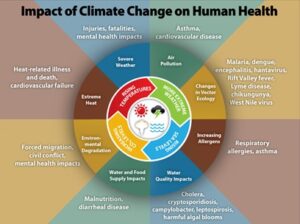What would the health care industry have done differently if it had known when the pandemic was coming? Does foresight change behavior?
In the fall of 2021 – even as COVID-19 was continuing to ravage communities around the world – the medical research community declared our rapidly warming climate is the “greatest threat” to global public health. What are we doing now to prepare?
Climate change is increasingly driving catastrophic events that affect large regions indiscriminately –
forceful hurricanes and tornado outbreaks, droughts and flooding, wildfires and ice storms. As a social determinant of health, however, threats to our physical environment disproportionately impact disadvantaged populations.
One study estimates the health costs of air pollution and climate change already exceed $800 billion annually and are growing. Our country’s health care system itself is estimated to produce about 9% of annual greenhouses gasses from the U.S. and is responsible for 4.4% of worldwide net emissions. Beyond emissions, the health care industry produces an estimated 5.9 million tons of waste per year.
So what’s the industry to do?
The U.S. Department of Health and Human Services, which is working on multiple fronts to halve U.S. carbon emission by 2030, plans to establish emission goals and potential penalties for noncompliance by hospitals. The HHS Office of Climate Change and Health Equity has not shared details but you can join its listserv for future updates.
In its proposed Hospital Inpatient Prospective Payment Rule, the Centers for Medicare and Medicaid Services (CMS) is seeking comments on how health care providers can best prepare for climate change. CMS also wants feedback on how the agency can best support hospitals in reducing their emissions.
And the Securities and Exchange Commission recently proposed a new rule for climate-related disclosures by publicly traded companies. The proposed rule will require public companies – including those operating hospitals, outpatient facilities and other points of care – to develop disclosures and put in place accounting and auditing controls.
Some hospitals and health systems are already on the road to eliminating their carbon footprint. Kaiser Permanente achieved its carbon neutrality goal in 2020. The Ohio State University Wexner Medical Center established sustainability goals aligned with its strategic plan and Advocate Aurora Health is working to power its health care operations with 100% renewable electricity by 2030.
Climate change endangers human health. Regardless of the sustainability goals and potential penalties expected from HHS, hospitals and health systems have reason to not only set goals to reduce their environmental footprint but also to tell that story. Beyond the industry’s regulators, your investors, employees and communities are increasingly interested in corporate social responsibility.
Are you prepared to share your sustainability story? Lovell can help.



